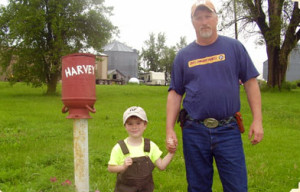Promise City, IA
Jerry Harvey, an Iowa dairy farmer, has recently become a grassroots organizer, pulling together dairy farmers in the fight for their livelihoods.
Born and raised in Iowa, Jerry Harvey has worked on a dairy farm for all of his life, working his way up from relief milker to owner. When the owner of the dairy he worked at for 13 years passed away and the family decided to sell the farm, Jerry reluctantly took a job in town. But he didn’t like it and it wasn’t long before he went to the bank, got himself a loan and bought that farm, which he owns and operates with his sons Jamey and Jeremy today. Harvey Family Dairy milks about 70 Holstein and Holstein-crosses farming on close to 250 acres in Wayne County, Iowa.
Jerry and his boys acknowledge dairying is a sacrifice; as Jerry explains, “Cows give milk seven days a week, 365 days a year–there’s no day off in dairying.” But as Jerry puts it, “It’s a sacrifice worth making because we’re working to build something together. This is a family farm–it’s our way of life.”
With the help of his sons Jamey and Jeremy, part of the family works together (Jerry and his wife Carol have five children, three of which work off the farm, and seven grandchildren) and they all enjoy some time off together. Jamey and Jeremy share milking duties and Jerry is back in his role as relief milker, taking a few shifts so that each of the men gets one day off a week. In between the morning and evening milkings, all three men are busy fixing fences and equipment, baling hay, hauling manure, and running the in and outs of the family farm. Jerry says, “There’s always something to do.”
But lately there’s been even more to do. In January, Jerry picked up the phone and called Farm Aid. “I’m a dairy farmer in Iowa and times are tough,” he began. “I’m calling to find out what I can do to help other dairy farmers because I know I’m not alone in this.”
Farmers being the kind of people they are, Farm Aid occasionally gets these kinds of calls. The farm movement that started during the 1980s grew out of this sentiment — this desire for folks going through a hard time to not just throw up their hands and give up but instead to dig in, get involved, and help others through it too. Jerry is one of those people.
We gave Jerry a couple local resources to start with–Farm Aid-funded groups who would be helpful to him as he got to know the issues around dairy pricing and why farmers have seen their milk checks cut in half over the past year. Joel Morton, Farm Aid Hotline Coordinator, and Jerry have been talking regularly ever since. Since that first call, Jerry, with the help of his sons and fellow Iowa farmers Chad Tiffany and Andy Nagel, as well as farm advocate Dave Knipper, have organized a dairy rally in Des Moines, appeared in print, and on radio and tv, gotten to know their congresspeople, and have planned the next rally, which takes place Saturday, May 30, 2009 in Manchester, Iowa, and includes dairy farmers from Iowa, Wisconsin, Minnesota, New York and Pennsylvania.
You may have seen Jerry on the news… he’s an eloquent farmer speaking about what’s close to his heart. But as he explains it, “I don’t know all the reasons behind what’s going on right now–I just know there’s something wrong. This isn’t just happening to the small dairies; it’s not an issue of, you know, this is the way business works and we’re weeding out the weak ones and the strong will survive. This dairy crisis is weeding out thousands of farmers. And we can’t afford that.”
Jerry never thought he’d be doing this kind of advocacy work. He says, “I’m not really built for this. I’m a country boy–I want to do my work, go fishing, and have fun. I’m no politician. But if we don’t do something, we’re not going to have any dairy farms left.” He enumerates the benefits that dairy farmers bring to their communities: providing a strong tax base, supporting other local farmers who raise hay and grain for animal feed, spending money at the lumber store and hardware store, investing in the local bank, providing jobs for haulers who transport feed and milk, and more. But for Jerry the point is that dairy farming is a way of life he and his family enjoy.
“We want to stand up for what we believe in and that’s that everyone deserves a fair chance. Not everyone will be a success in business and we’re not saying they should, but when all dairy farmers are facing this 50% drop in their milk checks, checks that can’t even cover half the bills, there’s something wrong with the system and there’s got to be a better way.”




